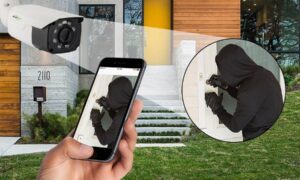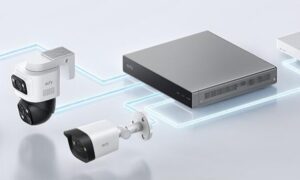Security cameras have become an integral part of home and business security in modern times. These cameras not only provide an extra layer of security, but also allow users to monitor their properties from a distance. In this article, we will discuss the different types of beveiligingscamera available and what to look for when choosing a security camera.
There are two main types of security cameras: wired and wireless. Wired cameras are connected to a network via an Ethernet cable. Wireless cameras, on the other hand, work over a wireless connection, such as Wi-Fi. The advantage of wireless cameras is that they are easy to install and require no cables, which is useful for older homes and buildings where running cables can be difficult. Wired cameras are generally more reliable and less likely to malfunction than wireless cameras. Home security cameras are devices that monitor and protect your home. You can purchase indoor and outdoor security cameras. And they often include HD resolution and other features like two-way talk, night vision, and smartphone controls. The first question you may ask yourself is simple: is a security camera necessary in the first place? And the answer depends on the level of security you want to add to your home or business. While sensors can detect motion, letting you know if doors or windows have been opened or closed, without cameras, you can’t actually see what’s going on at home.
In addition to the type of camera, it’s important to consider what features you need. The following are some important factors to keep in mind when choosing a security camera.
Resolution: The resolution of the camera determines how clear the image is. Consider a higher resolution camera for better image quality. This is especially important if you use the cameras to capture faces or license plates.
Motion detection: Motion detection is a useful feature that automatically activates the camera when motion is detected. This can reduce unnecessary video recording and save storage space.
Night vision goggles: Night vision goggles are important if you use the cameras to monitor properties at night. Choose a camera with night vision to ensure that you can still get clear images in the dark.
Storage: Consider how you want to store the footage from the cameras. Some cameras have internal storage, while others use cloud storage or a separate DVR. Consider the cost and functionality of each type of storage.
IP rating: The IP rating of the camera determines how well the camera can withstand the elements. If the camera will be installed outdoors, it is important to choose a camera with a high IP rating to ensure it can withstand rain, wind, and other elements.
Installation: Finally, it is important to consider how the cameras will be installed. Some cameras are easy to install yourself, while others require professional installation. Consider how much time and effort you want to invest in the installation process. Cameras can also get you help faster; in terms of audio verification versus video verification, the police department in Fremont, California found that audio verification alone had a 95 percent chance of being a false alarm; Salt Lake City found false alarm rates of 82 percent, while the police in Burien, Washington found rates of 92 percent.1 In sum? Audio isn’t enough on its own; for the police to really see what’s going on, a camera is necessary.



































